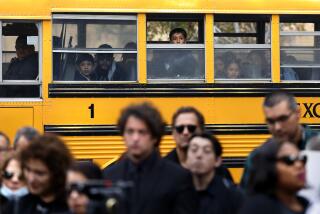Did We Rear a Bunch of ‘Moral Mutants’? : Ethics: A new report contends the moral fiber of young people is definitely weakening, and it places the blame for a generation’s downfall squarely on parents, teachers and employers.
- Share via
Michael Josephson has seen the future, and it doesn’t work--at least for him. He sees high school students who cheated on exams becoming jet airline mechanics who falsify maintenance reports. He sees legions of young job applicants claiming degrees they don’t have to get jobs they aren’t qualified for. He sees a tooth-and-nail scramble for economic survival, reward and prestige that will trample proper conduct, honesty and altruism into a sticky, carpet-ruining mess.
And Josephson believes he knows who the culprits will be: People between 18 and 30, raised in an environment of greed, corruption, selfishness and dishonesty.
The reason for the independently wealthy, former law school professor’s grim vision is a new report from his ethics institute on the conduct of America’s young people.
Scheduled for release Friday, “The Ethics of American Youth: A Report on the Values and Behaviors of the 18-30 Generation,” argues that there are “undeniable signs that the moral fiber of our country is weakening and that, as this generation takes its place in society in decision-making positions, the situation is likely to get worse.”
The 60-page study from the Joseph and Edna Josephson Institute for the Advancement of Ethics asserts that “an unprecedented proportion of today’s young generation lacks commitment to core moral values such as honesty, respect for others, personal responsibility and civic duty.”
Josephson, who has repeatedly demonstrated a flair for both publicity and confrontation, acknowledges that the report is potentially the most controversial work to come out of his foundation.
In fact, the combative Josephson, who founded the Marina del Rey-based institute five years ago in honor of his parents, says he is eager for argument, if it promotes a better understanding of the ethical state of the nation and the next generation.
Even if he is proved wrong, Josephson, whose two consuming interests are his ethics work and his 14-year-old son, probably won’t be fazed. This week, he has been cheerfully calling attention to a profile of him in the current issue of California magazine. One of his favorite lines: “He plays the next-door neighbor who shows up at your door with a shovelful of dog poop.”
But for now, Josephson, who made his money in publishing and bar exam review courses, stands firmly by the report’s findings, bolstered by an array of statistics and other evidence from surveys of young people, studies of academic honesty and resume fraud, sexual behavior, criminal patterns, voting habits, sports conduct and student loan defaults.
“There’s a natural disposition to think that wherever there’s bad news, there must be offsetting good news if you have a picture this bleak,” he said in an interview. “I will tell you, I don’t find any offsetting good news.”
Indeed, Josephson believes the news is so bad that he has labeled his targets “the I-deserve-it” or “IDI” generation, a tag he invented in hopes it will catch on much as “the Me Decade” became a buzz phrase of the 1970s.
Some figures cited in the report:
* A 1989 Gallup poll found that 89% of those ages 18 to 29 thought their generation was more selfish than previous generations. Moreover, 82% believed their generation was more materialistic.
* A long-term UCLA survey of college freshmen found that in 1970, some 39% thought financial success was important or essential. In 1989, the figure jumped to 75%. In contrast, in 1970, 82% of college freshmen thought that “developing a meaningful philosophy of life” was important; by 1989, the number was exactly half that, 41%.
* Cheating is rampant in high school and college. The Josephson report cites various studies showing that, overall, about 75% of high school students admit to cheating, while about 50% of college students do. A 1986 study of 2,200 California secondary students found that 73% of students said they had cheated on a test at least once; 57% admitted they had cheated a few times. The consequences of cheating? They’re usually mild, and the odds of getting caught are tiny, the report says. A Claremont College doctoral candidate told Josephson’s researchers that he had accepted money from a close friend to write a paper for her. The grad student is quoted as saying: “It was a challenge. And it was also 50 bucks. For $500, I’d take pictures of myself naked.”
* Experts on resume fraud quoted in the report say that anywhere from 12% to 30% of resumes contain “deliberate inaccuracies.” One expert told institute researchers that a young man who claimed he had a degree justified his lie by saying he “fully intended” to earn the degree someday.
These examples represent only a fraction of the evidence marshaled in the report to support its contentions.
But Josephson is convinced the numbers add up to an alarming total. Moreover, he is certain that today’s parents, teachers, employers and public servants have only themselves to blame.
“It isn’t our view that these are moral mutants,” Josephson said. “These are not people who had some genetic disposition toward immoral conduct. But they grew up in a society where misbehavior was all around them, where people were not enforcing the rules of ethics. . . .
“Young people, especially, are not apt to develop philosophical theories about ethics. They adopt very pragmatic theories about ethics. What do they get rewarded for? What do they get punished for? What seems to work?
“So my view,” he continued, “is this generation is the price we are paying for our own moral deterioration. But rather than just rag on them or bash them, that’s not as relevant to me as what does it mean for the ‘90s.
“This is, in fact, the generation who are entering the work place. They’re going to be our airline mechanics; they’re going to be our bankers; they’re going to be our lawyers. And if a higher proportion of them . . . have a history of cheating and lying, what can we expect it to be like in the ‘90s as they gain power?”
While Josephson finds no reasons for optimism, the report notes that others see brighter prospects for America’s youth. The report cites in a footnote the William T. Grant Foundation, which last year concluded that the popular perception of “a ‘troubled and irresponsible’ younger generation is largely mistaken.”
But Samuel Helprin, an author of the Grant Foundation report, said in a telephone interview that the study was not directed specifically at values: “What we found is that despite horrendous trends . . . all the social pathologies (that affect young people), the majority of American youth were somehow making it. But that’s a little bit different from saying their values are OK.”
On the other hand, Dorothy Stoneman, head of a national program aimed at helping poor young people build housing for the homeless, said she finds “a tremendous craving among young people for honesty” from adults.
Stoneman, whose National Youth Build Coalition is based in the Boston area, also said she finds young people have “a tremendous craving to belong to something that represents the highest ideals of society.”
Josephson, however, is unimpressed with reports that pure altruism lurks in the hearts of the young. For instance, his report concedes that volunteerism among the young may be increasing. But it quickly points out that “the moral significance of this is clouded by the fact that many ‘volunteers’ perform services as part of mandatory school community service programs, and a high proportion admit that their main goal was to put something good on their resumes.”
Even younger generation members who reject the greed of their peers don’t escape Josephson’s lash. Labeled “Don’t want its” in the report, they are lambasted for having “a different form of self-centeredness characterized by avoidance of discomfort rather than by the pursuit of pleasure.”
Here, Josephson sees an atypical glimmer of hope. Namely, that the preoccupation with self can be turned to society’s advantage.
“The good part of the news is that all is not lost because as a generation, they are very very self-centered, which means they’ll do whatever it takes,” he explained. “Well, what if we make it that they have to do right?”


